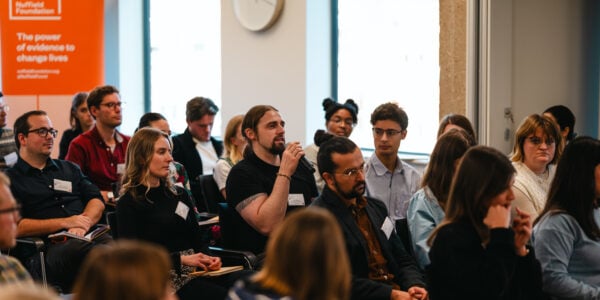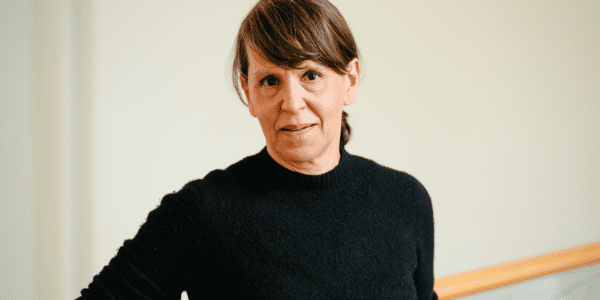
31/07/24
4 min read
Our Director of Strategy and Engagement reflects on how Nuffield research should respond to a fast-changing society and the pressures upon it
During this year of the Nuffield Foundation’s 80th Anniversary, we have taken time to reflect on how the world and the UK have changed since our last strategy was published in 2017, what is happening in society around us, and what we want to prioritise – as we prepare to shape our next five-year strategy in 2025.
We have talked to researchers, universities, civil servants, Parliamentarians, local authorities, practitioners, commentators and others. We have run two stakeholder consultations, and have held a wide-ranging series of events, including:
- a session with regional business and policy leaders to consider the future of work and skills
- a day looking at the urgent need for justice system reform and possible routes to this
- a knowledge exchange exploring intersectionality and its implications for research, policy and practice
- the launch of our early career researcher network
- a major conference in June, where we examined the risks and insecurities across the life course for people living in the UK.
New societal challenges
Each of these conversations has reinforced for us the changed context in which we are now operating, and the scale and complexity of the challenges facing policymakers – and those turning policy into practice – over the next five years. As our consultation phase draws to a close, we have recognised the complexities of the UK’s economic stagnation, the extent of its numerous societal inequalities, the need to understand and respond to intergenerational tensions, and rectify the severe fraying of public institutions. We have at the same time discussed the revolution in science and technology that is underway as digital and artificial intelligence shapes the future of work, relationships, and public services, bringing both opportunity and risk.
Findings from our June conference
Our conference in June particularly highlighted three issues for us which provide important lenses for our future research funding:
- The ways in which we think about the collective pooling (as opposed to the individual bearing) of risk; and the difficult choices this presents for policymakers on questions of taxation and investment in public services. Our keynote speaker Sir Andrew Dilnot set out this framing, linked to the changing demography of the UK, and especially our ageing population.
- The importance of geography when it comes to inequality, and the extent to which the place where people live continues to shape their opportunities and life course. This felt particularly salient when we looked at the experience of young people and their transition from education into work.
- The need for public institutions which can engage with the ‘whole person’ rather than seeing individuals through the single lens of education or benefits or their contact with the justice system. This was illustrated very clearly for us by Dame Clare Moriarty of Citizens Advice, when she spoke about the complexity of lives and the substantial increase in the numbers of people seeking urgent advice on multifaceted issues. We discussed some of the ways in which the development of AI could potentially help – as well as the associated risks.
The big questions shaping our future focus
So, what do the conclusions from our programme of consultation and convening mean for our future focus? We will want to address five broad questions that consider:
- How we can build a prosperous and fair society, where people are secure and can fulfil their potential
- How we can build an inclusive society, where people feel they belong and can live well, in the context of changing demography and ways of life
- How we can ensure people and society benefit from rapid developments in science and technology so that opportunities are maximised, and potential harms minimised
- How we can build a sustainable society – and sustainable places – including in the context of the climate and environmental crises
- How we can rebuild and maintain the effective, accountable, and trustworthy institutions that we need to support our society and maintain the legitimacy of the rule of law.
Grants to reflect these questions
We are interested in receiving research applications that begin to address some of these themes in our next round of grants funding this autumn. We are interested in how the questions connect, and in how we can also link the perspectives of our research areas (welfare, justice, education) to the practical application of the work of our three expert centres (the Ada Lovelace Institute, the Nuffield Council on Bioethics, and the Nuffield Family Justice Observatory. For example, we are currently running a project on the potential benefits and risks of using AI in education). We are interested in multidisciplinary work and in a range of intersectional approaches.
We will focus on improving lives through our evidence and other work
The scale of some of the challenges that we have been discussing has made us ever clearer that the research we fund must bring about usable evidence that can improve policy and practice and thereby affect change. Our new strategy will better define how we can bring about change in different ways, and we will be particularly looking to fund research proposals which can clearly articulate the real-world difference that they expect to make. We are also interested in proposals for direct interventions in our areas of focus.
Foundation’s new strategy will launch in 2025
Ultimately, our strategy consultation and reflection has reinforced our purpose: We are independent. We fund rigorous research, encourage innovation and support the use of sound evidence to improve people’s lives.
Our new strategy will be published in 2025.








